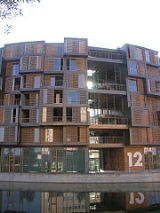
Tietgenkollegiet
Encyclopedia
Tietgenkollegiet named for Danish financier C. F. Tietgen
(1829-1891), is a student residence built in new district Ørestad
close to the centre of Copenhagen
.
The building has a conspicuous circular shape, inspired by traditional southern Chinese Hakka architecture
, and is designed by Danish architects
Lundgaard & Tranberg
in 2006. The design has won it a RIBA European Award
.
Its concept focuses on how the accommodation can help encourage the personal and social development of the students. The courtyard, around which all common areas are located, reinforces the idea of community. It also enables the often monotonous student corridor to become not only spatially interesting but unending, linking all student ‘houses’ on each floor.
Carl Frederik Tietgen
Carl Frederik Tietgen was a Danish financier and industrialist. The founder of numerous prominent Danish companies, many of which are still in operation today, he played an important role in the industrialisation of Denmark...
(1829-1891), is a student residence built in new district Ørestad
Ørestad
Ørestad is a developing city area in Copenhagen, Denmark, on the island of Amager. It is expected that 20,000 people will live in Ørestad, 20,000 will study, and 80,000 people will be employed in the area...
close to the centre of Copenhagen
Copenhagen
Copenhagen is the capital and largest city of Denmark, with an urban population of 1,199,224 and a metropolitan population of 1,930,260 . With the completion of the transnational Øresund Bridge in 2000, Copenhagen has become the centre of the increasingly integrating Øresund Region...
.
The building has a conspicuous circular shape, inspired by traditional southern Chinese Hakka architecture
Hakka architecture
A Hakka walled village is a large multi-family communal living structure that is designed to be easily defensible. This building style is unique to the Hakka people found in southern China...
, and is designed by Danish architects
Architecture of Denmark
The architecture of Denmark has its origins in the Viking period, richly revealed by archaeological finds. It became firmly established in the Middle Ages when first Romanesque, then Gothic churches and cathedrals sprang up throughout the country...
Lundgaard & Tranberg
Lundgaard & Tranberg
Lundgaard & Tranberg Arkitekter is a Danish architectural firm, based in Copenhagen Denmark. It is most noted for the Tietgenkollegiet student housing in Ørestad from 2006 and the Royal Danish Playhouse on the Copenhagen harbourfront from 2008...
in 2006. The design has won it a RIBA European Award
RIBA European Award
RIBA European Awards are part of an award program by the Royal Institute of British Architects. Complemented by the RIBA National and International Awards, it rewards "the excellent work being done by RIBA members in the European Union outside the UK". Awarded annually, it is given to a varying...
.
Architecture
The round building has seven stories. Five vertical lines divide the building both visually and functionally into sections and also serve as continuous passages that provide access from outside to the central courtyard and to the different stories. The ground floor has common facilities: a café, auditorium, study and computer rooms, workshops, laundry, music and meeting rooms, and bicycle parking. The apartments are located on the other stories, 12 in each segment. All rooms face the façade and have a view of the surroundings. The common kitchens/auxiliary rooms, lounges, and terraces are located on the central court, bringing residents together.Its concept focuses on how the accommodation can help encourage the personal and social development of the students. The courtyard, around which all common areas are located, reinforces the idea of community. It also enables the often monotonous student corridor to become not only spatially interesting but unending, linking all student ‘houses’ on each floor.

